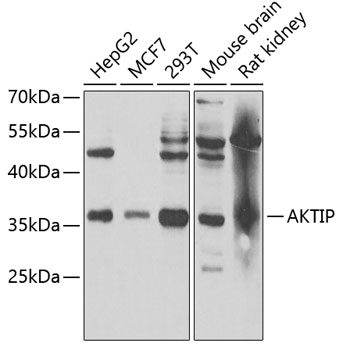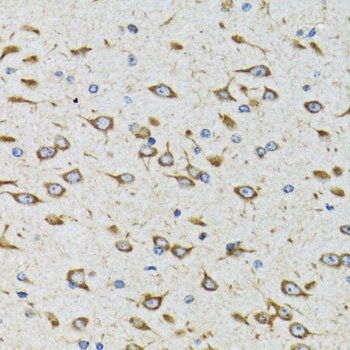Cell Death Antibodies 2
Anti-AKTIP Antibody (CAB6239)
- SKU:
- CAB6239
- Product Type:
- Antibody
- Reactivity:
- Human
- Reactivity:
- Mouse
- Reactivity:
- Rat
- Host Species:
- Rabbit
- Isotype:
- IgG
- Antibody Type:
- Polyclonal Antibody
- Research Area:
- Cell Death
Description
| Antibody Name: | Anti-AKTIP Antibody |
| Antibody SKU: | CAB6239 |
| Antibody Size: | 20uL, 50uL, 100uL |
| Application: | WB IHC |
| Reactivity: | Human, Mouse, Rat |
| Host Species: | Rabbit |
| Immunogen: | Recombinant fusion protein containing a sequence corresponding to amino acids 1-292 of human AKTIP (NP_071921.1). |
| Application: | WB IHC |
| Recommended Dilution: | WB 1:500 - 1:2000 IHC 1:50 - 1:200 |
| Reactivity: | Human, Mouse, Rat |
| Positive Samples: | HepG2, MCF7, 293T, Mouse brain, Rat kidney |
| Immunogen: | Recombinant fusion protein containing a sequence corresponding to amino acids 1-292 of human AKTIP (NP_071921.1). |
| Purification Method: | Affinity purification |
| Storage Buffer: | Store at -20'C. Avoid freeze / thaw cycles. Buffer: PBS with 0.02% sodium azide, 50% glycerol, pH7.3. |
| Isotype: | IgG |
| Sequence: | MNPF WSMS TSSV RKRS EGEE KTLT GDVK TSPP RTAP KKQL PSIP KNAL PITK PTSP APAA QSTN GTHA SYGP FYLE YSLL AEFT LVVK QKLP GVYV QPSY RSAL MWFG VIFI RHGL YQDG VFKF TVYI PDNY PDGD CPRL VFDI PVFH PLVD PTSG ELDV KRAF AKWR RNHN HIWQ VLMY ARRV FYKI DTAS PLNP EAAV LYEK DIQL FKSK VVDS VKVC TARL FDQP KIED PYAI SFSP WNPS VHDE AREK MLTQ KKPE EQHN KSVH VAGL SWVK PGSV QPFS KEEK TVAT |
| Gene ID: | 64400 |
| Uniprot: | Q9H8T0 |
| Cellular Location: | Cell membrane, Cytoplasm, Peripheral membrane protein |
| Calculated MW: | 33kDa |
| Observed MW: | 36kDa |
| Synonyms: | AKTIP, FT1, FTS |
| Background: | The mouse homolog of this gene produces fused toes and thymic hyperplasia in heterozygous mutant animals while homozygous mutants die in early development. This gene may play a role in apoptosis as these morphological abnormalities are caused by altered patterns of programmed cell death. The protein encoded by this gene is similar to the ubiquitin ligase domain of other ubiquitin-conjugating enzymes but lacks the conserved cysteine residue that enables those enzymes to conjugate ubiquitin to the target protein. This protein interacts directly with serine/threonine kinase protein kinase B (PKB)/Akt and modulates PKB activity by enhancing the phosphorylation of PKB's regulatory sites. Alternative splicing results in two transcript variants encoding the same protein. |
| UniProt Protein Function: | AKTIP: an oncogenic membrane-associated protein that is a component of the FTS/Hook/FHIP complex (FHF complex). The FHF complex may function to promote vesicle trafficking and/or fusion via the homotypic vesicular protein sorting complex (the HOPS complex). Regulates apoptosis by enhancing phosphorylation and activation of AKT1. Increases release of TNFSF6 via the AKT1/GSK3B/NFATC1 signaling cascade. Belongs to the ubiquitin-conjugating enzyme family. FTS subfamily. Component of the FTS/Hook/FHIP complex (FHF complex), composed of AKTIP/FTS, FAM160A2, and one or more members of the Hook family of proteins HOOK1, HOOK2, and HOOK3. May interact directly with HOOK1, HOOK2 and HOOK3. The FHF complex associates with the homotypic vesicular sorting complex (the HOPS complex). Apparently interacts with AKT1. A member of the ubiquitin-conjugating enzyme family, FTS subfamily. Lacks the conserved Cys residue necessary for ubiquitin-conjugating enzyme E2 activity. Two isoforms of the human protein are produced by alternative splicing. |
| UniProt Protein Details: | Protein type:Apoptosis; Membrane protein, peripheral; Vesicle Chromosomal Location of Human Ortholog: 16q12.2 Cellular Component: plasma membrane Molecular Function:protein binding; ubiquitin protein ligase binding Biological Process: early endosome to late endosome transport; endosome organization and biogenesis; endosome to lysosome transport; lysosome organization and biogenesis; positive regulation of protein amino acid phosphorylation; positive regulation of protein binding |
| NCBI Summary: | The mouse homolog of this gene produces fused toes and thymic hyperplasia in heterozygous mutant animals while homozygous mutants die in early development. This gene may play a role in apoptosis as these morphological abnormalities are caused by altered patterns of programmed cell death. The protein encoded by this gene is similar to the ubiquitin ligase domain of other ubiquitin-conjugating enzymes but lacks the conserved cysteine residue that enables those enzymes to conjugate ubiquitin to the target protein. This protein interacts directly with serine/threonine kinase protein kinase B (PKB)/Akt and modulates PKB activity by enhancing the phosphorylation of PKB's regulatory sites. Alternative splicing results in two transcript variants encoding the same protein. [provided by RefSeq, Jul 2008] |
| UniProt Code: | Q9H8T0 |
| NCBI GenInfo Identifier: | 54035954 |
| NCBI Gene ID: | 64400 |
| NCBI Accession: | Q9H8T0.1 |
| UniProt Secondary Accession: | Q9H8T0,Q503B1, Q53H38, |
| UniProt Related Accession: | Q9H8T0 |
| Molecular Weight: | 33kDa |
| NCBI Full Name: | AKT-interacting protein |
| NCBI Synonym Full Names: | AKT interacting protein |
| NCBI Official Symbol: | AKTIP |
| NCBI Official Synonym Symbols: | FT1; FTS |
| NCBI Protein Information: | AKT-interacting protein |
| UniProt Protein Name: | AKT-interacting protein |
| UniProt Synonym Protein Names: | Ft1; Fused toes protein homolog |
| Protein Family: | AKT-interacting protein |
| UniProt Gene Name: | AKTIP |
View AllClose








